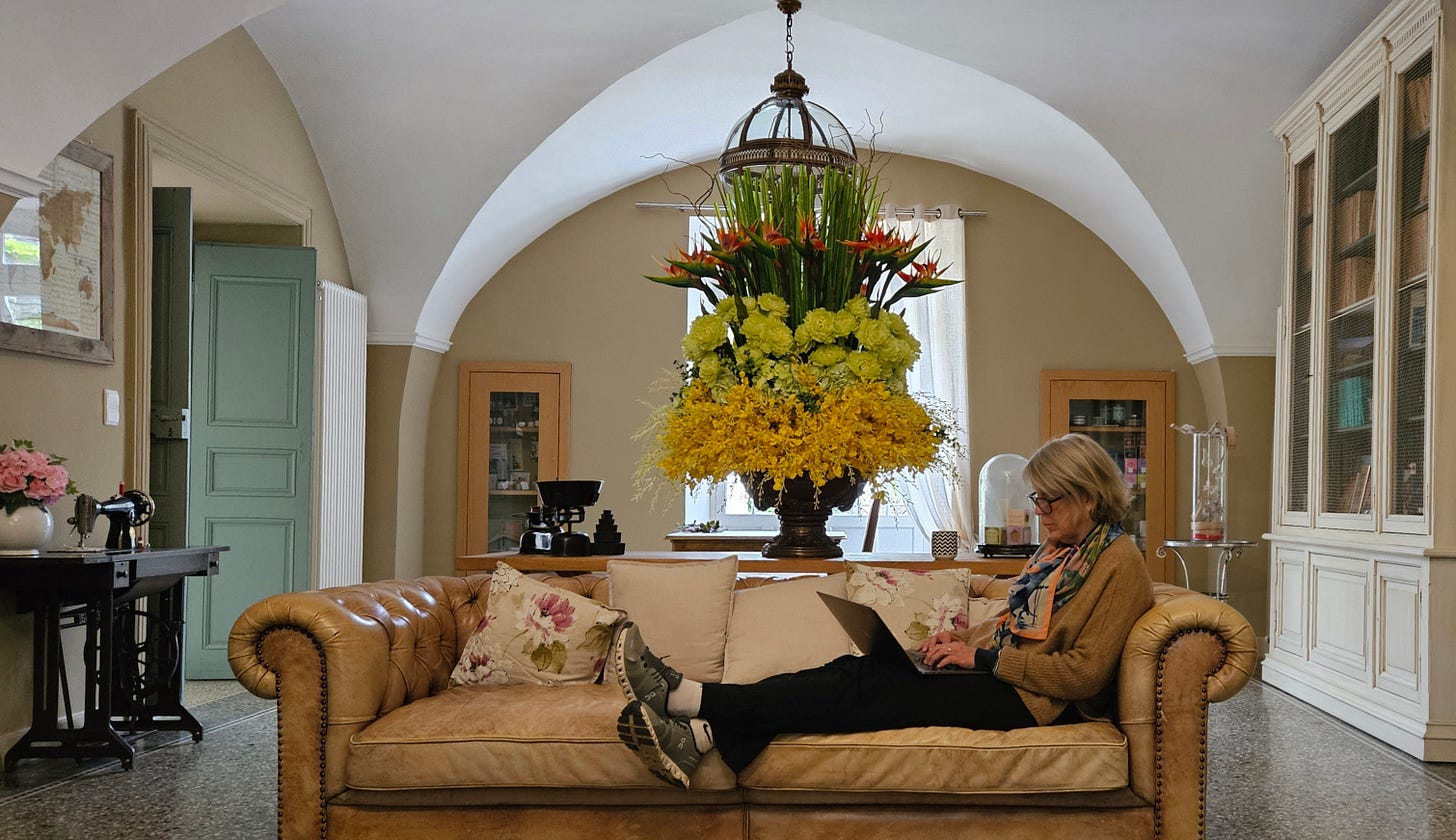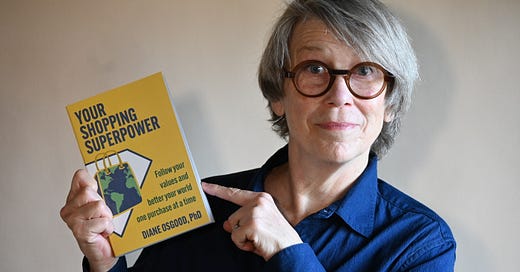Now you can be a shopping "Superpower" too
E188: Meet Diane Osgood, Sustainability Expert, Earth Day
Today’s post:
I share excerpts from Diane Osgood’s long-awaited book “Your Shopping Superpower”. The timing of the release could not be more appropriate.
Sharing a profile of Diane Osgood, Sustainability Expert. [I am resurrecting the profiles segment of this newsletter.] Today, you meet someone who created her own career and title, where one did not exist before. In a world where jobs and careers are disappearing as fast as the number of tree species in the Amazon rain forest, isn’t that empowering?
We all have the power to change the world through the products we buy. Here’s a guidebook that shows you how.
— Paul Rice, Founder, Fair Trade USA and author of Every Purchase Matters
Diane Osgood has been writing this book for as long as I have known her. (You met Diane in previous posts, because she co-designs and co-hosts the wonderful Writers Retreats I attend in France1.) I have watched the birth, the rewrites, the publication house pitches etc. from the sidelines. I think the universe manipulated the publication of this book to fall at a time when we are each querying how and where we place our purchasing dollars. The timing could not be more perfect!
Disclosure: Diane crafted and shared some of the material below as excerpts and promotional material for her book. I have edited and embellished based on conversations we have shared, and my experience of her as a person who walks her talk.
Your Shopping Superpower
I wrote a book, Your Shopping Superpower, because where your shopping dollars go, the economy follows. — Diane Osgood
Have you been feeling like a pawn in the Trade Wars, powerless to make an impact, create influence, or have your voice heard in the fight for sustainable products? Like me, you can rediscover your agency with this book that gives us the insider scoop—from an expert whose bespoke consulting service has spent decades advising everyone from Richard Branson at Virgin and working on the Clinton Global Initiative.2 It is like getting a personal audience with a guru, a much sought-after industry consultant.
Amid economic uncertainty, where you spend matters more than ever before.
Our shopping choices can unintentionally contribute to social injustice, climate change, and exposure to harmful toxins. Many people wish they could do more to combat these unjust and unsustainable outcomes.
Vote with our wallet to help reshape the economy to better reflect what we value. Much of the global economy (70% in the U.S.) is driven by consumer spending, and every purchase we make has a physical and social impact on the world.
This book is a great combo. Diane, a self-professed “nerd with a knack for translating complex issues into plain words”, has done a great job of distilling the informational and educational Why? with simple infographics and data.
Your Shopping Superpower offers a comprehensive guide that navigates toward positive and sustainable shopping practices by providing pragmatic tips, tools, and revealing how our habits can help reduce climate change, support companies with equitable workplace conditions, and foster diverse, local businesses.
Most people are instigated to explore better shopping habits for one or more of the following reasons:
People: Buy brands that treat people fairly.
Planet: Buy environmentally responsible products.
Community: Buy local and from businesses with diverse ownership.
Health: Shop to avoid potential health hazards.
Costs: Keep costs down.
Diane’s book explains the issues in each sector. She fills the Why, starting with behind-the-scenes stories. There is plenty for those who like to see numbers, research and graphs - pitched at just the right level. Then she goes one step further. She fills the void and offers practical How To? advice so that we hold a solution in the palm of our hand:
Make one impactful change a week.
Seek trustworthy certifications.
Use ratings systems and apps.
Avoid the worst offenders.
Tell the brands you care.
Oh, the stories she could tell
What I truly appreciated about this book is that it is accessible. Diane has many case studies to draw on, a boots-on-the-ground retelling that could break your heart. But she stops short of ‘preachy’ and focuses on ‘practical’. She offers three “superpower” principles (excerpt):
No rights, no wrongs. There isn’t one set of “right” priorities or “right” choices that applies to everyone. Your neighbors, friends, and cousins may be motivated by different issues than you are. Focus on what matters to you.
Start close to your heart. Select an issue that you care deeply about. Make one shopping change a week to address this issue. For example, if you place a high value on fairness or equality, you may decide to focus on how workers are treated. The first change you make may be to buy Fair Trade Certified chocolate. Next week you can add another fair labor product to your list— say, coffee or that new pair of jeans you’ve been eyeing.
Progress, not perfection. Perfection is a long way off. At some future moment, all products may be ethically produced and environmentally restorative, ushering in fair treatment of all workers, and supporting local economies. Until then, focus on making steady progress, one purchase at a time. Focusing on progress also protects you from feeling despair.
There. I’ve given you a peek! I could easily quote the entire book. You will know why this book is one you feel called to reach for.
I cannot think of a more opportune time for this book to be published. I see it becoming the “Atomic Habits” answer for anyone who suddenly understands more about tariffs and the interconnectedness of the global economy than they ever expected they would.
When you start shopping consistently with your values, more profound rewards await you. — Diane Osgood

Now discover more about Diane …
Meet Diane Osgood, Sustainability Expert — in conversation
These profiles3 are designed to showcase the spectrum of careers available. They offer young students, parents, and educators (and second-act-seekers) a vision that you can create your own job to fill an empty niche.
Diane earned one of the first PhDs in Environmental Economics issued by LSE (London School of Economics) in the 1990s. That places her at the vanguard of the modern-day Sustainability movement with over three decades of experience and learning to her credit.
I asked her, “What was it like to be in this field so early on?” Her reply reminded me of that phrase See a problem, solve a problem — there was no roadmap available on how to navigate the space. Each day is one of discovery. As she put it, each day they were developing new language to navigate what began as supply chain ethics and iterated, becoming ESG (Environment, Social, Governance), using their instincts to guide them. This field has undergone significant rebranding over the decades.
Along the way, she and the optimistic army of professionals that are her friends discovered reporting tools, ratings, and instituted regulatory reporting. “It was a journey of peaks and valleys,” she told me, “each time searching for the right next step.”
I think this is an important message for anyone entering the Explorer Generation. Whether it is Prompt engineer, Bioethics advisor, or Space strategist, there are no roadmaps for how to navigate these nascent career opportunities. That is a trademark of career development in the Future of Work. You find something you are passionate about - either a problem that needs fixing, or a passion that magnetizes your attention - and then you build a depth of knowledge and body of work around it.
Did Diane always see herself in the role of “Sustainability Expert”?
Not really. [And this is the reason I share these profiles!] Aged 14, she imagined a career in photography. She earned her undergrad economics degree from the University of San Francisco, where she learned a lot about ethics and philosophy.
So what propelled her into this field? Origins of humankind, making things as a kid, growing up in farming.
And the visceral experience of watching a tropical forest decimated before her eyes to provide ‘product’ to consumers, but destroying the natural habitat of the wild orangutans she was studying in Kalimantan, Indonesia.
What advice would you give a teen today?
Every role needs to consider sustainability. No matter how you find the work that occupies your time as you move forward in life (pertinent whether you are 14- or 104-years-old) understand how to incorporate factors of sustainability into the product or work stream.
Discover and understand the planetary boundaries4. These represent a set of nine planetary boundaries within which humanity can continue to develop and thrive for generations to come. [I am discovering more about this after our conversation.] Given that a Tilt the Future mantra is “The best idea can come from anyone, anywhere, at any time” these boundaries offer us the opportunity to research fixes and solutions.
Learn to frame good questions. I can think of no better advice. Whether it is for networking, researching or creating an AI prompt, doing the hard work of understanding what you want to ask, then framing the question appropriately, is a crucial 21st-century skill.
Diane’s UN SDG picks:
She picked 14—Life below water because “humans don’t like to think in extranalaties”. We need to focus on what we can do to stop our oceans from over-heating, because they are a holistic report card for Planet Earth.
Find out more about Diane Osgood:
LinkedIn, https://www.linkedin.com/in/diane-osgood/
on her website https://dianeosgood.com/
She is a co-author with Seth Godin and others on the best-selling The Carbon Almanac (Penguin, 2022) and writes occasionally for online journals.
Find
on Substack (she has special offers for those who purchase her book)"}…{`
Over to you:
Does today’s post inspire you? Does Diane?
How do you advise young teens exploring the future and the workspace?
This essay pairs well with previous editions ‘E186: Ask the right question’ and last week’s E187: LinkedIn hack to discover more about careers that interest us. Hit the ⬅️ below.
Hello, Tribe Tilt!
Several new members have discovered this publication. Welcome! You have self-selected into this powerful, wonderful group. Please add your voice and join our conversations. We believe the best ideas can come from anyone, anywhere, at anytime.
Stay healthy. From there, all else becomes possible.
Until next week …
Karena
Writers Retreat posts:
2023: E85: Focus on the size of you On Overwhelm, climate, Diane Osgood. Friends & Family IRL 2 - The Cevennes, France
2024: E140: Unplug Rest & Recap 20 - Writers Re"treat" in The Cévennes
Don’t believe me? Check out the Experience section of Diane’s LinkedIn. And read the book to discover phrases like “… when former president Bill Clinton and I were walking Haiti, and he encouraged me to pursue my focus on consumers.”
Directory of Member profiles: https://tiltthefuture.substack.com/i/135698508/member-profiles
https://www.stockholmresilience.org/research/planetary-boundaries.html The planetary boundaries concept presents a set of nine planetary boundaries within which humanity can continue to develop and thrive for generations to come











Brilliant!!!
Excellent timing for this book Diane. Ever since I read Barbara Kingsolver's book, 'Animal, Vegetable, Miracle', I've adopted BK's stance as a 'locavore' - buy as much as possible as locally as possible. Economically it has much greater impact beyond the €€ or $$ actually spent. Obviously I can't buy locally grown coffee or bananas, so it's not about being perfect. Small steps as you say Karena (and Diane).